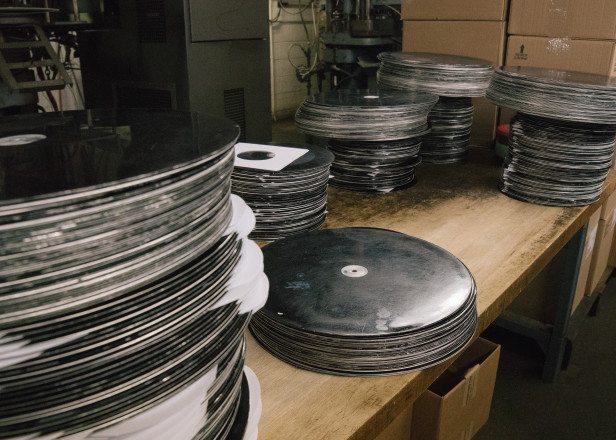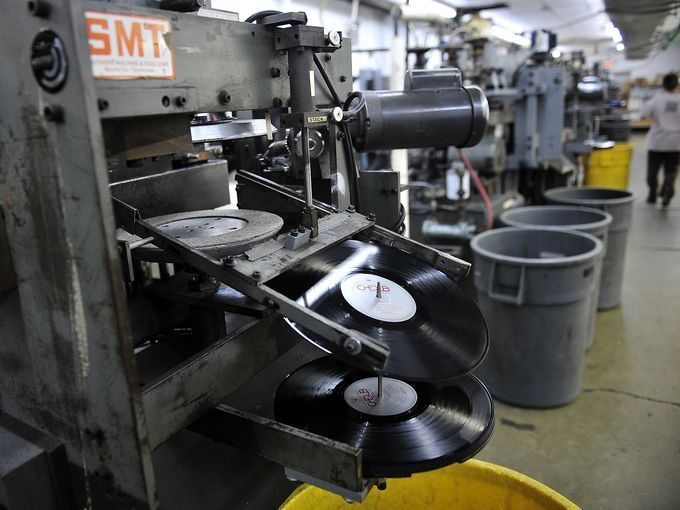
We have a problem.
The music industry has been celebrating a surge of interest in one of its most beloved artifacts: the vinyl record. Major labels are returning to their old business model and are quickly saturating clothes stores, online shops, electronics outlets and international vinyl-themed holidays with reissues of old classics.
It’s easy to get swept up in the hype – after all, this is surely a worthy alternative to streaming for the music fan with a fondness for physical objects. However, the vinyl boom is hiding problems that could have disastrous implications for popular culture. Vinyl production worldwide is currently operating way above its capacity, and expensive materials, expert knowledge and antiquated techniques have led to to supply shortages and quality problems.
For independent labels, especially those specializing in electronic music, who survived the last two decades by focusing on vinyl in a time when CDs dominated, the resurgence of interest has resulted in more disadvantages than advantages. In fact, their very existence is now in jeopardy. Thaddeus Herrmann, long-standing label owner and editor of German online magazine Das Filter explains why this is the case, what the actual problems are and why the survival of the humble vinyl record is in danger.
In the summer of 2013, the music industry met in Röbel, Germany.
They were invited to visit Optimal Media, one of the largest pressing plants in Europe for CD, DVD and vinyl. Based on the edge of the Mecklenburg Lake District, the company has produced physical media since 1990. With modern assembly lines for digital data carriers such as CDs and DVDs, a large press and logistics and fulfillment center, the company is one of the largest job creators in a region weak on infrastructure. It is a company that serves the entertainment industry worldwide, especially when it comes to vinyl.
The SommerFest was intended not only to take care of business relationships, but also to inaugurate the company’s new vinyl presses. “We really thought the new machines would relieve pressure in our production,” Jens Alder of the Berlin label Morr Music remembers. “However, after the Fest it just got worse.” Even though machines had been restored properly, one thing that was not considered in the planning was that the gas feed did not have enough power to provide the presses with enough output. It would take months before this problem was remedied. In the meantime, the production delays for vinyl just increased.
The labels that never stopped releasing vinyl records, and the labels who saved the production infrastructure from bankruptcy, now see themselves trapped within a highly competitive industry that is attempting, by hell or high water, to find its footing with a few remaining manufacturers that simply cannot meet demand. The point of failure, however, is not limited to securing capacity in the pressing plants. The problems start a long time before this process begins.
“THE REAL PROBLEM IS NOT IN THE PRESSING – THE BOTTLENECK IS IN THE ELECTROPLATING.”
Silke Maurer, Handle With Care
In contrast to the CD, which for the most part is produced in a completely automated way with machines available on the open market, vinyl’s manufacturing chain is divided into many small parts. It is complicated and requires a lot of work by hand, both in the actual pressing plant as well as with the other steps in the production. Manufacturers have watched as business has boomed in the last few decades, but important investments were ignored, and this is the reason why today’s labels and musicians have to allow up to four months to produce a vinyl record. Even when working three shifts a day and through the weekend, the production facilities can’t deliver in a timely manner. How can that be when even in genres that have traditionally pressed to vinyl, the production runs have continually decreased over the last few years?
“That’s exactly the problem,” explains Silke Maurer of Handle with Care, one of the largest production agencies for records. With her team, she coordinates the production of recordings for numerous labels, no matter whether it is on vinyl, CD, white label or in a box set. “In the last four years, vinyl production has almost doubled here. That sounds super, but you have to take a closer look at how the numbers come together. In the same timeframe, the first run of a title has reduced nearly by half. That means more work for the press. The machines have to be reconfigured more often, which takes a lot of time. But the real problem is not in the pressing – the bottleneck is in the electroplating.”
Electroplating, a process which involves coating the master lacquer in a metal layer to produce stampers, is time-intensive and requires highly trained personnel. Those who have learned electroplating are still a long way from being able to prepare the lacquer – the lengthy process requires a great deal of experience and expertise. Only then can it be guaranteed that the music sounds how it is supposed to sound. And all this has to happen quickly – when the music is cut to the lacquer, it can’t be stored indefinitely. A time period of over two weeks is considered to be problematic.
“The production of vinyl is actually a very lucrative business, at least that was the case in the past,” says Maurer. “The margin is high and the machines are old and completely paid for. As long as production volume stayed the same for the most part, that was it. There should have been new investment much earlier, especially in electroplating.”
Indeed, a trip to a pressing plant offers a bizarre picture. The machines look like they were taken straight from a museum and installed on the factory floor. It is loud, narrow and hot. Every 30 seconds the presses spit out a record that is either automatically placed in a sleeve or put on a spindle in order to be sleeved by hand.
Read more at FactMag





I have a collection of vinyls and am keen to hear about the industry past and present